| 9 August |
• yesterday • tomorrow |
| Optional Memorial of Saint Teresa Benedicta of the Cross, Virgin and Martyr |
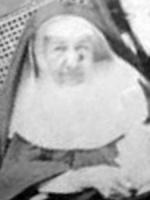
• Barbara Cope
• Barbara Koob
• Maria Anna Barbara Cope
• Mother Marianne
• Sister Marianne
Born to a poor working class family, one of eight children. Came to the United States when her parents emigrated in 1840, and she grew up in the Utica, New York area. Left school after the eight grade to work in a factory for nine years and help raise her younger siblings. Joined the Sisters of Saint Francis in Syracuse, New York in 1862, taking the name Sister Marianne, and making her vows in 1863. Teacher. Superior of a convent. Member of the council that governed her community. Supervisor of Saint Joseph's Hospital in 1870; it was the only hospital in Syracuse, and cared for the sick regardless of race or religion, a rarity in the day. Directress of novices. Provincial Superior of her community in 1877. In November 1883 she and six of her sister Franciscans went to Honolulu, Hawaii to care for lepers. Mother Marianne had planned to stay a few weeks, help establish the facilities, and then return to Syracuse; she spent 35 years there and only returned when her remains were moved in 2005 as part of her beatification preparations. They completely revamped the conditions of the patients, vastly improving their housing and care. In 1885 she founded a home for the daughters of patients who lived in the colony. In November 1888 she and two sisters founded a home and school for girls on Molokai. In 1895 she took over the boy's home that had been founded by Blessed Damien de Veuster. In her later years she was confined to a wheelchair due to chronic kidney disease.
23 January 1838 in Heppenheim, grand duchy of Hesse-Darmstadt, Germany as Barbara Koob
• 9 August 1918 at Kalaupapa, Maui County, Hawaii of a heart attack
• most relics are being housed and conserved at the Saint Marianne Cope Shrine and Museum in Syracuse, New York, having been transferred there in 2005 as part of the canonization investigation
• there are display relics at each of the five provinces of the Sisters of Saint Francis
• there are two display relics held in Rome, Italy, one given to Pope John Paul II at the time of the beatification of Saint Marianne, and one given to Pope Benedict XVI at the time of her canonization
• there is a display relic in possession of the bishop of the diocese of Syracuse
• there are two display relics in possession of the diocese of Honolulu, Hawaii, one of them enshrined in the Cathedral Basilica of Our Lady of Peace, Honolulu on 31 July 2014
• there is a display relic in the parish of Saint Joseph and Saint Patrick in Utica, New York, the home parish of Saint Marianne
• there is a display relic in the Church of the Assumption in Syracuse where Saint Marianne took her vows, lived and worked
• 14 May 2005 by Pope Benedict XVI
• beatification recognition celebrated by Cardinal Saraiva Martins at Saint Peter's Basilica, Vatican City, Rome, Italy
21 October 2012 by Pope Benedict XVI
I now turn to Marianne Cope, born in eighteen thirty-eight in Heppenheim, Germany. Only one year old when taken to the United States, in eighteen sixty-two she entered the Third Order Regular of Saint Francis at Syracuse, New York. Later, as Superior General of her congregation, Mother Marianne willingly embraced a call to care for the lepers of Hawaii after many others had refused. She personally went, with six of her fellow sisters, to manage a hospital on Oahu, later founding Malulani Hospital on Maui and opening a home for girls whose parents were lepers. Five years after that she accepted the invitation to open a home for women and girls on the island of Molokai itself, bravely going there herself and effectively ending her contact with the outside world. There she looked after Father Damien, already famous for his heroic work among the lepers, nursed him as he died and took over his work among male lepers. At a time when little could be done for those suffering from this terrible disease, Marianne Cope showed the highest love, courage and enthusiasm. She is a shining and energetic example of the best of the tradition of Catholic nursing sisters and of the spirit of her beloved Saint Francis. - Pope Benedict XVI's canonization homily for Saint Marianne
https://catholicsaints.info/saint-marianne-cope/
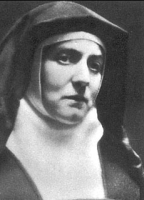
• Edith Stein
• Teresia Benedicta
Youngest of seven children in a Jewish family. Edith lost interest and faith in Judaism by age 13. Brilliant student and philospher with an interest in phenomenology. Studied at the University of Göttingen, Germany and in Breisgau, Germany. Earned her doctorate in philosophy in 1916 at age 25. Witnessing the strength of faith of Catholic friends led her to an interest in Catholicism, which led to studying a catechism on her own, which led to "reading herself into" the Faith. Converted to Catholicism in Cologne, Germany; baptized in Saint Martin's church, Bad Bergzabern, Germany on 1 January 1922.
Carmelite nun in 1934, taking the name Teresa Benedicta of the Cross. Teacher in the Dominican school in Speyer, Germany and lecturer at the Educational Institute in Munich, Germany. However, anti-Jewish pressure from the Nazis forced her to resign both positions. Profound spiritual writer.
Both Jewish and Catholic, she was smuggled out of Germany, and assigned to Echt, Netherlands in 1938. When the Nazis invaded the Netherlands, she and her sister Rose, also a convert to Catholicism, were captured and sent to the concentration camp at Auschwitz where they died in the as chambers like so many others.
12 October 1891 at Breslaw, Dolnoslaskie, Germany (now Wroclaw, Poland) as Edith Stein
• gassed on 9 August 1942 in the ovens of Oswiecim (a.k.a. Auschwitz), Malopolskie, Poland
• body cremated
11 October 1998 by Pope John Paul II
• against the death of parents
• Europe
• martyrs
Star of David
Whatever did not fit in with my plan did lie within the plan of God. I have an ever deeper and firmer belief that nothing is merely an accident when seen in the light of God, that my whole life down to the smallest details has been marked out for me in the plan of Divine Providence and has a completely coherent meaning in God's all-seeing eyes. And so I am beginning to rejoice in the light of glory wherein this meaning will be unveiled to me. - Saint Teresa Benedicta of the Cross
God is there in these moments of rest and can give us in a single instant exactly what we need. Then the rest of the day can take its course, under the same effort and strain, perhaps, but in peace. And when night comes, and you look back over the day and see how fragmentary everything has been, and how much you planned that has gone undone, and all the rasons you have to be embarrassed and ashamed: just take everything exactly as it is, put it in God's hands and leave it with Him. Then you will be able to rest in Him - really rest - and start the next day as a new life. - Saint Teresa Benedicta of the Cross
Learn from Saint Thérèse to depend on God alone and serve Him with a wholly pure and detached heart. Then, like her, you will be able to say 'I do not regret that I have given myself up to Love'. - Saint Teresa Benedicta of the Cross
O my God, fill my soul with holy joy, courage and strength to serve You. Enkindle Your love in me and then walk with me along the next stretch of road before me. I do not see very far ahead, but when I have arrived where the horizon now closes down, a new prospect will prospect will open before me, and I shall meet it with peace. - Saint Teresa Benedicta of the Cross
https://catholicsaints.info/saint-teresa-benedicta-of-the-cross/
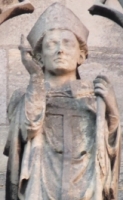
Maurilius, Maurille
Born to the Gallic nobility. Studied theology in Liege, Belgium and in Saxony in modern Germany; member of the cathedral chapter of Halberstadt. By 1030 he was a monk at Fécamp, France. After some years, he withdrew from communal life to live as a hermit in Vallombrosa, Italy. Maurilio’s wisdom and holiness led the Marquis Bonifacio to order him to become the abbot the San Maria abbey in Florence, Italy. The monks there objected so strongly to his reform attempts that they tried to poison Maurilio; he returned to Fécamp. In 1055 he was appointed the archbishop of Rouen by Duke William the Conqueror of Normandy. He worked to restore discipline to his priests, presided over councils, helped impose a truce between warring families and feudal houses, and united them to fight against highway robbers and brigands. Helped Saint Anselm of Canterbury come to see that he had a call to religious life. Maurilio built several churches, consecrated the cathedral of Rouen in 1063, and the abbey church of Jumièges on 1 July 1067.
c.1000 in the diocese of Rheims, France
• 9 August 1067 of natural causes
• legend says that when they were preparing to take the body to the local church for his funeral Mass, Maurilio suddenly sat up and described what he had seen in the afterlife including places near Jerusalem with crowds of saints, others with crowds of demons, and the damned suffering in Hell; he gave his clergy a warning to guard their souls, then laid down for the final time
• buried in the Rouen cathedral
• tomb destoyed by Huguenots in 1562
https://catholicsaints.info/saint-maurilio-of-rouen/
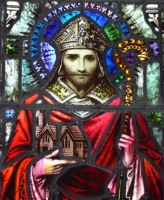
• Cromnathy
• Cruimhthir Nathy
• Crumther Nathy
• Nathy Cruimthir
• Nathy the Priest
• Nahi, Nath Í, Nathi, Nateo, Nateus
Nothing reliable is known about his early life. Spiritual student of Saint Finnian of Clonnard. Priest. Founded a church and monastery at Achonry, Ireland. The monastery became a noted center for learning and piety. Spiritual teacher of Saint Fechin of Fobar. May have been a bishop, but records are scant and varied. Known for his personal sanctity, he spent a very long life spreading the faith.
at Luighne, Sligo, Ireland
1903 (cultus confirmed)
• Achonry, Ireland, city of
• Achonry, Ireland, diocese of
The impression...which his works produced on the minds of his contemporaries has been handed down in the tribute which the successive writers that mention the name of Nathy never fail to pay to his extraordinary sanctity. Other Irish saints are noted for characteristic virtues: Columbkille, for love of churches; Finnian of Clonard, for zeal in teaching; Brendan for pious voyages; Columbanus and others, for missionary activity; but the patron of Achonry shines chiefly by preeminent sanctity. It is a great distinction. - Archdeacon Terence O'Rorke, writing on Saint Nathy
https://catholicsaints.info/saint-nathy/
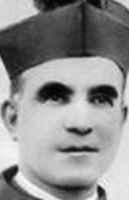
Florentinus Asensio Barroso
Born to a poor but devout family. Ordained on 1 June 1901 in Valladolid, Spain. Graduated as a doctor of theology from the Pontifical University of Valladolid, and then taught there. Priest at the metropolitan cathedral of Valladolid; many of his homilies have survived. Spiritual director and confessor to several religious congregations. Bishop and apostolic administrator of Barbastro, Spain on 26 January 1936. His five months as bishop were noted for his charity to the poor and sick. However, this was a period of hostility to the Church by the state. Bishop Florentino was put under house arrest, then imprisoned, then on 1 August 1936 was moved to solitary confinement. He was tortured and mutilated and finally murdered. One of the martyrs of the Spanish Civil War.
16 October 1877 at Villasexmir, Valladolid, Spain
• shot three times through the temple on 2 August 1936 in a cemetery outside Barbastro, Huesca, Spain
• buried in a common grave with other victims
• later exhumed and re-interred in the cathedral crypt
4 May 1997 by Pope John Paul II
https://catholicsaints.info/blessed-florentino-asensio-barroso/
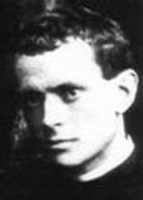
Faustino of Our Lady of Sorrows
Son of Isidoro Oteiza and Angela Segura. Baptized at the age of one day. Studied at the Piarist College of Estella, Spain. A bout of pneumonia when he was 14 was so sever that he was given last rites, but managed to recover. Entered the Piarist novitiate on 9 November 1905 at Peralta de la Sal, Spain, and made his solemn vows on 15 July 1912. Priest, ordained on 14 September 1913 in Terrassa, Spain. Novice master at Peralta de la Sal, Spain. Primary school teacher for several years. Had a great devotion to Jesus in the Eucharist, and to the Blessed Virgin Mary. Suffered from Parkinson’s Disease, but never let it interfere with his work. Arrested on 23 July 1936 with his entire religious community in the persections of the Spanish Civil War; he spent his time in prison writing letters, all of which report that he and his brothers never lost their faith. Martyr.
14 February 1890 in Ayegui, Navarra, Spain
• shot in the afternoon of 9 August 1936 in Azanuy, Huesca, Spain
• body doused with gasoline and set on fire
• remains buried in Azanuy
1 October 1995 by Pope John Paul II
https://catholicsaints.info/blessed-faustino-oteiza-segura/
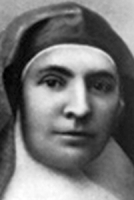
Juana Josefa Cipitria y Barriola
Oldest of seven children born to Juan Miguel Cipitria and María Jesús Barriola. The family were weavers, and Juana learned the craft as a child. At age 18 she left home to work as a maid to a family in Burgos, Spain. Juana early felt a call to religious life, and on 8 December 1871 she founded the Congregation of the Daughters of Jesus to work for a Christian upbringing of children, and to improve the condition of woman in Salamanca, Spain. She took the name Mother Candida Maria de Jesus, and the Congregation received papal approval from Pope Leo XIII on 30 July 1901. Mother Candida based her spirituality on the Spiritual Exercises of Saint Ignatius of Loyola.
31 May 1845 in Andoáin, Guipúzcoa, Spain as Juana Josefa Cipitria y Barriola
9 August 1912 in Salamanca, Spain of natural causes
17 October 2010 by Pope Benedict XVI
https://catholicsaints.info/saint-candida-maria-de-jesus-cipitria-y-barriola/
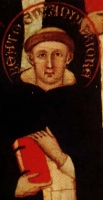
Related to Norman princes. Educated at Bologna, Italy. Physically small, he was noted by all for his leadership and organizational skills. Dominican friar, receiving the habit from Saint Dominic in 1219 while still in university. With twelve brother Dominicans, he founded a friary near Florence, Italy in 1220. The men in this house caused a great evangelical stirring in Florence, and they were given the monastery of Santa Maria Novella; under the Dominican's direction, it became a noted center for art and education.
c.1190 at Salerno, Italy
• 1242 of natural causes
• buried at the church of Saint Maria Novella in Florence, Italy
• relics translated several times, the last being on 18 February 1571
1783 by Pope Pius VI (cultus confirmed)
God of truth, for the spread of the faith you made Blessed John a renowned preacher of your word. By the help of his prayers may we confess with our mouths unto salvation what we believe with our hearts unto justice. We ask this through our Lord Jesus Christ, your Son, who lives and reigns with you and the Holy Spirit, one God, for ever and ever. - General Calendar of the Order of Preachers
https://catholicsaints.info/blessed-john-of-salerno/
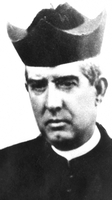
Ordained a priest of the archdiocese of Granada, Spain, Father Cayetano continued studying canon law for several years. He served in parishes in Alfornón, Alboloduy, and Loja, and was noted for a devotion to the Blessed Virgin Mary. At the outbreak of the Spanish Civil War, his church was burned by anti–Catholic forces. Father Cayetano went into hiding, but was soon located, arrested, imprisoned and executed for his faith. When he and his fellow prisoners were taken out to be murdered, Father Cayetano asked that he be killed last so he could hear final confessions and give absolution to each of the others. Martyr.
27 November 1866 in Alfornón, Granada, Spain
• 9 August 1936 in the cemetery of Loja, Granada, Spain
• buried in an unmarked grave in that cemetery
28 November 2019 by Pope Francis (decree of martyrdom)
https://catholicsaints.info/blessed-cayetano-gimenez-martin/
Viva Cristo Rey! (Long live Christ the King!) - Blessed Cayetano's last words
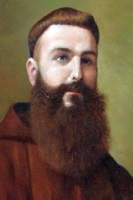
Father Germán of Carcagente
Franciscan Capuchin friar, making his profession on 15 August 1912. Priest, ordained on 9 February 1919. School teacher with a strong ministry to the poor. Taught at the College of San Buenaventura de Totana in Murcia, Spain. Taught at the Seraphic Seminary of Massamgrell. In the persecutions of the Spanish Civil War, he was forced into hiding. Arrested on 9 August 1936, he was beaten and abused for a day, then dragged to a nearby bridge and murdered for the crime of being a priest. Martyr. His final acts and words were to forgive his executioners.
12 February 1895 in Carcagente, Valencia, Spain
• shot on the night of the 10 August 1936 on an iron railroad bridge in Carcagente, Valencia, Spain
• body thrown into the river
• body later recovered and buried in the cemertery at Carcagente
11 March 2001 by Pope John Paul II
https://catholicsaints.info/blessed-jose-maria-garrigues-hernandez/
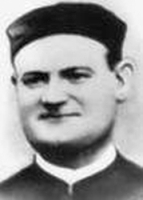
Florentín of Saint Francis Borgia
Son of Miguel Felipe and Francisca Naya; he was baptized on the day of his birth. Entered the Piarist novitiate on 27 February 1876 in Paralta de la Sal, Spain as a lay brother; he made his solemn profession on 29 April 1883. Served for over 50 years in the kitchens and schools of a number of Piarist houses in Aragon, Spain. In his late 70’s, his eyesight dimming, nearly deaf, he retired to spend his days in prayer. Martyred in the Spanish Civil War.
10 October 1856 in Alquézar, Huesca, Spain
• shot on the afternoon of 9 August 1936 in Azanuy, Huesca, Spain
• body doused with gasoline and set on fire
• remains later buried in Azanuy
1 October 1995 by Pope John Paul II
What do you say, Father, shall we go to heaven? – Blessed Florentin as the Piarists were being readied for transport to their place of execution
https://catholicsaints.info/blessed-florentin-felipe-naya/
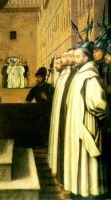
John Bere
• 4 May as one of the Carthusian Martyrs
• 1 December as one of the Martyrs of Oxford University
Nephew of Richard Bere, abbot of Glastonbury. Educated at the Glastonbury abbey school and then Oxford. He refused an arranged marriage, and studied law at the Chancery in London. He then abandoned the law and in 1523 became a Carthusian choir monk at the London Charterhouse. Imprisoned and martyred with several of his brothers for refusing to take the Oath of Supremacy acknowledging King Henry VIII as head of the Church.
Glastonbury, England
starved to death on 9 August 1537 in Newgate prison, London, England
20 December 1886 by Pope Leo XIII
https://catholicsaints.info/blessed-richard-bere/
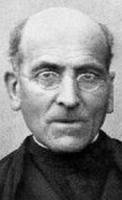
Priest. Member of the Sons of the Holy Family. Novice master and general counsel of Saint Jose Manyanet and the Sons. Teacher and spiritual advisor, noted for his ascetic lifestyle, personal piety, ability as a preacher and devotion to the Holy Family. Poet. Martyred in the anti-Catholic excesses of the Spanish Civil War.
1 November 1867 in Sant Andreu de Palomar, Barcelona, Spain
• morning of 9 August 1936 in the Riera de Sant Andreuin, Barcelona, Spain
• buried in the cemetery of Sant Andreu de Palomar in Barcelona
13 October 2013 by Pope Francis
https://catholicsaints.info/blessed-narcis-sitja-baste/

Fermo
Martyrs. Saint Zeno of Verona, also from North Africa, brought their relics to his diocese; some locals revised the story of the martyrdom to indicate that the two were Italian nobles, but this seems unlikely.
3rd century North Africa
c.290
Berzo San Fermo, Italy
https://catholicsaints.info/saint-firmus-of-verona/
https://catholicsaints.info/saint-rusticus-of-verona/
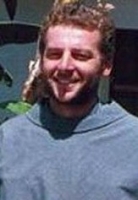
Franciscan Conventual priest. One of the Martyrs of Chimbote, murdered by Shining Path Communist guerillas.
3 July 1958 in Tarnów, Poland
9 August 1991 in Pariacoto, Ancash, Peru
• 5 December 2015 by Pope Francis
• beatification celebrated at the Estadio Centenario Manuel Rivera Sánchez, Chimbote, Peru, presided by Cardinal Angelo Amato
https://catholicsaints.info/blessed-zbigniew-adam-strzalkowski/
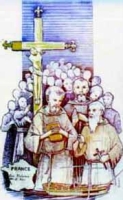
Benedictine monk at the monastery in Metz, France. Priest. Imprisoned on a ship in the harbor of Rochefort, France and left to die during the anti-Catholic persecutions of the French Revolution. One of the Martyrs of the Hulks of Rochefort.
19 May 1741 in Lérouville, Meuse, France
9 August 1794 aboard the prison ship Deux-Associés, in Rochefort, Charente-Maritime, France
1 October 1995 by Pope John Paul II
https://catholicsaints.info/blessed-claude-richard/
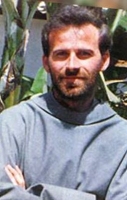
Franciscan Conventual priest. One of the Martyrs of Chimbote, murdered by Shining Path Communist guerillas.
23 September 1960 in Lekawica, Zywiec, Poland
9 August 1991 in Pariacoto, Ancash, Peru
• 5 December 2015 by Pope Francis
• beatification celebrated at the Estadio Centenario Manuel Rivera Sánchez, Chimbote, Peru, presided by Cardinal Angelo Amato
https://catholicsaints.info/blessed-michal-tomaszek/
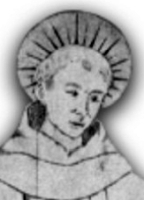
Joined the Franciscan Friars Minor in 1272. Part-time hermit, part-time evangelist and spiritual advisor in the area around Mount Alvernia, central and northern Italy. Had the gifts of infused knowledge, visions, ecstacies, and mind-reading.
1259 at Fermo, Italy
10 August 1322 of natural causes
1880 by Pope Leo XIII (cultus confirmed)
https://catholicsaints.info/blessed-john-of-alvernia/
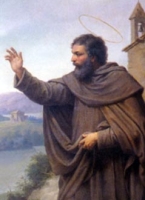
• Falco of Palena
• Falcon
Hermit in the Abruzzi region of Italy.
in the Calabria region of Italy
• 1440 of natural causes
• relics enshrined at Palena, Italy
1893 by Pope Leo XIII (cultus confirmed)
https://catholicsaints.info/blessed-falco-the-hermit/
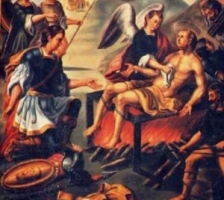
Soldier. Converted to Christianity by the example of Saint Lawrence of Rome, by whom he was baptized. Church ostiarius in Rome, Italy. Martyr. Figured in early fiction about the martyrs.
• c.258 in Rome, Italy
• relics in the churches of San Lorenzo and Santa Catarina dei Funari in Rome
https://catholicsaints.info/saint-romanus-ostiarius/
Banderik, Bandery
Bishop of Soissons, France in 540. Founded at monastery at Crépin, France. Exiled from his see, he worked as a gardener for seven years without revealing his identity, but was eventually found out and recalled.
566
https://catholicsaints.info/saint-bandaridus-of-soissons/
Fedhlimidh, Fedlemid, Fedlimid, Felim, Felix, Fidleminus, Fedlimino
Sixth century spiritual student of Saint Columba. Hermit. His reputation for holiness attracted would-be students who founded the city of Kilmore, Ireland around his cell. First bishop of Kilmore.
diocese of Kilmore, Ireland
https://catholicsaints.info/saint-phelim/
Seminarian. One of a group of Christians killed in the persecutions of Decius. Just before Numidicus died, Saint Cyprian of Carthage dragged him out of the fire and ordained him so that he died a priest.
burned at the stake in 251 in Carthage, North Africa
https://catholicsaints.info/saint-numidicus-of-carthage/
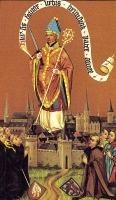
Adinctor, Auteur
Fifth-century bishop of Metz, France.
relics translated to the Marmoutier Abbey in 830
https://catholicsaints.info/saint-autor-of-metz/
Amour
Venerated in Franche-Comté, France, but his story has been lost over time.
relics enshrined at Saint-Amour in Burgundy, France
https://catholicsaints.info/saint-amor-of-franche-comte/
Ninth-century Benedictine monk. Abbot in Burgos, Spain. Martyred with 200 of his brother monks by invading Muslims.
put to the sword in 872 in Burgos, Spain
https://catholicsaints.info/saint-stephen-of-burgos/
Martyr.
4th century Sirmium, Pannonia (modern Sremska Mitrovica, Serbia)
https://catholicsaints.info/saint-rusticus-of-sirmium/
Fourth-century bishop of Châlons-sur-Marne, France
https://catholicsaints.info/saint-domitian-of-chalons/
30 July as one of the Martyred Hospitallers of Spain
A group of Colombian members of the Hospitallers of Saint John of God who worked together in Spain, and who were martyred together in the Spanish Civil War.
• Blessed Alfonso Antonio Ramírez Salazar
• Blessed Gabriel Maya Gutiérrez
• Blessed José Velázquez Peláez
• Blessed Luis Ayala Niño
• Blessed Luis Modesto Páez Perdomo
• Blessed Ramón Ramírez Zuluoga
• Blessed Rubén de Jesús López Aguilar
9 August 1936 in Barcelona, Spain
25 October 1992 by Pope John Paul II
https://catholicsaints.info/martyred-colombians-of-barcelona/
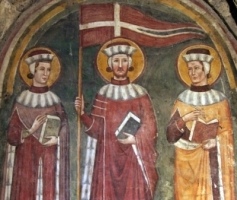
Three Christians martyred together in the persecutions of Decius. We know little more than the names - Marcellian, Secundian and Verian.
250 near Civitavecchia, Italy
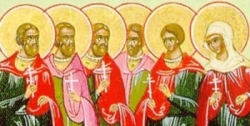
A group of ten Christians who were arrested, tortured and executed for defending an icon of Christ in defiance of orders from Emperor Leo the Isaurian. We know the names of three, but nothing else about them – Julian, Marcian and Mary.
beheaded in Constantinople
https://catholicsaints.info/martyrs-of-constantinople-9-august/
Thousands of people were murdered in the anti-Catholic persecutions of the Spanish Civil War from 1934 to 1939. I have pages on each of them, but in most cases I have only found very minimal information. They are available on the CatholicSaints.Info site through these links:
• Blessed Antonio Mateo Salamero
• Blessed Cayetano Giménez Martín
• Blessed Cayetano Giménez Martín
• Blessed Faustino Oteiza Segura
• Blessed Florentín Felipe Naya
• Blessed Francisco López-Gasco Fernández-Largo
• Blessed Guillermo Plaza Hernández
• Blessed Joan Vallés Anguera
• Blessed José María Celaya Badiola
• Blessed José María Garrigues Hernández
• Blessed Josep Figuera Rey
• Blessed Josep Maria Aragones Mateu
• Blessed Julián Pozo Ruiz de Samaniego
• Blessed Mateo Molinos Coloma
• Blessed Narcís Sitjà Basté
CatholicSaints.Info Portable Edition